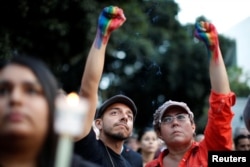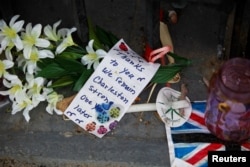Mass attacks like the one in Orlando this week can affect people emotionally all across the country, causing depression and anxiety. But a mental health expert says people must keep such incidents in perspective.
"It's very important to know this is not an epidemic. It's an isolated incident, and as an individual and a nation, we should not panic," says Frank Farley, former president of the American Psychological Association and now professor of educational psychology at Temple University.
In the worst mass killing in the United States in modern times, a gunman killed 49 people at the Pulse nightclub in Orlando, Florida, early Sunday before he died in a gun battle with police.
With such attacks, Farley says, there usually are three stages of fear that occur: primary terror that happens to people who were in the attack, secondary terror when the media starts reporting it, and tertiary terror when the media endlessly talks about it, which can prolong the fear and anxiety.
Americans react
Californian Lynn Wade was visiting Washington at the time of the Orlando bloodbath. "It's heart-wrenching to think that someone, no matter what their beliefs are, could make the decision to go in and cause that much devastation on so many people's lives," she said. "Not just the ones that were killed and injured but the families that are left behind."
The frequency of such attacks can wear down some people. Kayla Soltis, of Spotsylvania, Virginia, said: "It's very upsetting but it's something that has become very common in our American culture; it's not that I have become numb to it but it happens so often that's it's like another one, another one, but it doesn't make it less upsetting. My heart breaks for the victims and their families and I just wish we can get something done about it."
Soltis said she tries not to let news about violent attacks make her afraid. "No matter how scary it is that it can happen anywhere - at a movie theater, a school, a club where people are supposed to feel the safest - you just can't let fear win because that's going to stop you from living your everyday life. If we go on with our lives then violence won't win and the people who commit these acts won't win."
Still, mass shootings can have a profound effect on the general population and on communities targeted in an attack - the LGBT community, in this case - according to Laura D. Miller, a clinical social worker andpsychotherapist in New York. The club where the killings took place catered to the gay and lesbian community.
The club in Florida was a place where LGBT men and women could gather with "a positive sense of community and safety," Miller told VOA. The aftermath of the attack left many people feeling unsafe. "They are distrustful of other people in public, they feel hyper-vigilant [and have] a lot of the common effects of trauma."
Even those who were not present in Orlando, the psychotherapist said, "wonder whom they can trust and if they can ever be safe. ... They can become paranoid and isolated."
The National Alliance on Mental Illness says LGBT individuals are almost three times more likely than others to suffer from depression or anxiety disorders. In addition, federal crime statistics show that members of the LGBT community are more likely to be victims of hate crimes than are people in other groups, such as Muslims or African-Americans.
Through her work with patients "and just in general being in New York City," Miller said, she has seen increased fear in the LGBT community.
Managing the Effects
Recent mass-casualty incidents in the United States - in addition to Orlando, deadly shootings in San Bernardino, California; Charleston, South Carolina, and Newtown, Connecticut - have affected the mental health of the general population, said psychology professor Farley. The media focus on such attacks, as well the notorious attacks over the past 18 months in Paris and Brussels, contributes to fear.
It is important to shield very young children from news about such violence and bloodshed, Farley added. "It's only going to scare them, and we don't want to raise a nation of frightened and anxious children."
Experts' general recommendation is to keep children under 12 from seeing violent news reports. If that's not possible, the key thing will be to discuss what happened and assure children that they, their families and neighborhoods are not at risk. "It's an honest statement," Farley said, "because it's very important for parents to understand the statistical probability of another Pulse nightclub incident happening to your family is almost zero. And parents can raise their children in a healthy way on that probability."
For adults, he says the best way to avoid becoming overwhelmed by bad news is to avoid changing your behavior and to take care of your health. "Don't keep it inside," he says. "Get your views and feelings out there and ask your friends for their views and feelings in return. Sharing can take the sting out of your own viewpoints and fears."















